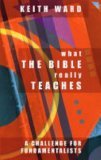GENERAL THEOLOGY What the Bible Really Teaches: A Challenge to Fundamentalists by Keith Ward (London: SPCK , 2004). Keith Ward, former Regius Professor of Divinity at Oxford, does not like conservative evangelicals. SPCK are promoting this book as follows: “Ward shows us how to let the Bible speak and be heard, free from the ‘spin’ that is often applied. [As he]… underlines the importance allowing the Bible to be its own interpreter, he encourages us to read its life-changing ancient texts with fresh insight and vision.” Yet what this book is really about is how mistaken the Professor thinks evangelicals have been on central issues of the faith. He attacks distinctively evangelical views on the infallibility of the Bible, the second coming, salvation, the cross, the resurrection, eschatology, and various other things, labelling them as “fundamentalist” and just plain wrong. In a rather patronising tone he tells his “Bible-believing friends” that they are not really biblical at all. He was converted, he says, “to an evangelical form of Christian belief”, but “[f]or forty years… my professional work has been the study of religion, theology and the Bible. I ended my professional career as the Regius Professor of Divinity (the senior Chair in theology) at Oxford University. That does not make me an expert on everything in the Bible. But it does mean that I have had access to the best biblical scholars in the world, and from them I have gained a better idea of what the Bible actually does say” (pages 2-3). Note the humble, self-effacing appeal to worldly position and privileged intellectual access! Note the straightforward claim to the inside track, superior knowledge of what the Bible really does say, over and against the ‘spin’ and inaccuracy of conservative evangelicals. Just where to start with such bold assertions is difficult. It is safe to say, however, that no-one except the most prejudiced anti-evangelical reading this book will be convinced that Mr. Ward has found, at last, the holy grail of presuppositionless exegesis. Indeed, the presupposition most at work in these pages is so blatantly that evangelicals have got it wrong, that the Bible must be so expounded as to make that preconceived basis of faith clear at every stage. For all his supposed erudition and access to “the best biblical scholars in the world”, the Professor seems blissfully unaware of major works of conservative evangelical scholarship which have satisfyingly answered many if not all of his allegedly fatal accusations. A cursory glance at Carson & Woodbridge’s Scripture and Truth (1983) or Hermeneutics, Authority and Canon (1986), both reprinted many times, shows his initial assumptions about evangelical views of inspiration to be utterly flawed. He attacks the substitutionary “theory” of the atonement as a late invention of Calvin (page 107); Ward was obviously too busy with other things when Garry Williams was at Oxford writing that chapter of his D.Phil. which shows how ancient this doctrine of the atonement is, or too convinced of his own inside track to notice all the patristic references in The Institutes. Even a cursory glance at a very basic evangelical textbook like How to read the Bible for all its Worth by Fee and Stuart should have given him pause for thought, and made him think twice about making such sweeping judgments concerning the state of evangelical understanding of the Bible. In Ward’s parallel universe, nothing achieved by Tyndale House in Cambridge over the last 50 years ever happened, and evangelical scholars never emerged from the primordial soup. Mr. Ward demonstrates no knowledge of any actual written work of “fundamentalists”, preferring instead to build straw men out of things these “friends” of his have supposedly said. Perhaps if these silly ideas emanated from an 18-year old first year theology undergraduate the professor met in a tutorial fresh from an evangelical youth group one could see how claiming 40 years of professional advancement, of reading and experience, could prove a sobering influence. It is the fact that Ward’s claims for himself are so elevated and his ability so highly praised that leads one to expect more, but he appears incapable of (so to speak) picking on someone his own size, presumably because he considers no evangelical scholar to be even close to his stature. The “challenge” in the subtitle turns out to be really no challenge at all, which was a great disappointment. I was hoping, when I accepted this book for review, to read a challenging, stimulating case against conservative evangelical doctrine and practice which would interact with real evangelicals and the things they say and do. Sadly, I found nothing but a condescending rant which only frustrated and annoyed me with its constant caricaturing tendencies and false assertions. “When evangelicals rediscover their own heritage, and read the Bible carefully, fundamentalism will fade away,” says Ward (page 182), by which he means belief in a divinely revealed Bible, a real judgment day, a non-universal salvation, a substitutionary atonement, and a physical resurrection will all disappear. It’s not worth interacting with his arguments in detail here in a short review, but it is hardly necessary either. Any reasonably well-taught evangelical perhaps with just a couple of IVP dictionaries to hand would be perfectly capable of seeing off such a weak and ineffectual challenge from a tired, rationalistic, moribund and limp liberalism. This review also appeared in Churchman 121/3 (2007). |
